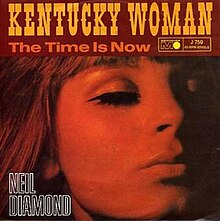
"Hush" is a song written by American composer and musician Joe South, for recording artist Billy Joe Royal. The song was later covered by Somebody's Image in 1967. It reached #15. It was also covered by Deep Purple in 1968 and by Kula Shaker in 1997. Each artist had a Top 5 hit with their version.

"I'm a Believer" is a song written by Neil Diamond and recorded by the Monkees in 1966 with the lead vocals by Micky Dolenz. The single, produced by Jeff Barry, hit the number-one spot on the U.S. Billboard Hot 100 chart for the week ending December 31, 1966, and remained there for seven weeks, becoming the last No. 1 hit of 1966 and the biggest-selling single for all of 1967. Billboard ranked the record as the No. 5 song for 1967. While originally published by Screen Gems-Columbia Music (BMI), it is now published by Stonebridge Music/EMI Foray Music (SESAC), with administration passed to Sony/ATV Music Publishing and Universal Music Publishing Group.
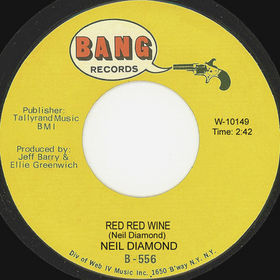
"Red Red Wine" is a song originally written, performed and recorded by American singer Neil Diamond in 1967 that appears on his second studio album, Just for You. The lyrics are written from the perspective of a person who finds that drinking red wine is the only way to forget his woes.
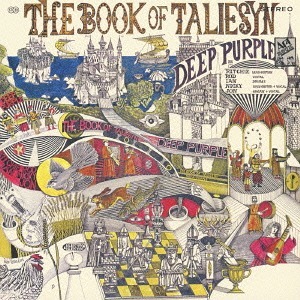
The Book of Taliesyn is the second studio album by the English rock band Deep Purple, recorded only three months after Shades of Deep Purple and released by Tetragrammaton Records in October 1968, just before their first US tour. The name for the album was taken from the 14th-century Book of Taliesin.

Reggie Grimes Young Jr. was an American musician who was lead guitarist in the American Sound Studio house band, The Memphis Boys, and was a leading session musician. He played on various recordings with artists such as Elvis Presley, Joe Cocker, Dobie Gray, Joe Tex, Merrilee Rush, B.J. Thomas, John Prine, Dusty Springfield, Lynn Anderson, Herbie Mann, J.J. Cale, Jimmy Buffett, Dionne Warwick, Roy Hamilton, Willie Nelson, Waylon Jennings, the Box Tops, Johnny Cash, Jerry Lee Lewis, Merle Haggard, Joey Tempest, George Strait, and The Highwaymen. Young was inducted into the Musicians Hall of Fame and Museum in 2019.
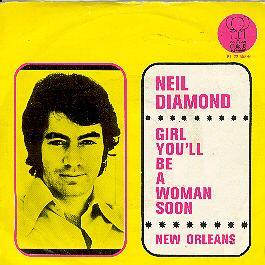
"Girl, You'll Be a Woman Soon" is a song written by American musician Neil Diamond, whose recording of it on Bang Records reached number 10 on the US pop singles chart in 1967. The song enjoyed a second life when it appeared on the 1994 Pulp Fiction soundtrack, performed by rock band Urge Overkill. Other versions have been recorded by Cliff Richard (1968), Jackie Edwards (1968), the Biddu Orchestra (1978), and 16 Volt (1998).

Only the Greatest is a studio album by American country music artist Waylon Jennings, released in 1968 on RCA Victor. It includes the single "Only Daddy That'll Walk the Line," which Jennings took to #2 on the country music charts that year.
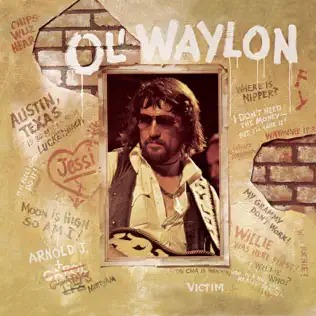
Ol' Waylon is a studio album by American country music artist Waylon Jennings, released on RCA Victor in 1977. It eventually became one of Jennings' highest-selling albums, due in no small part to the phenomenal success of the chart-topping "Luckenbach, Texas ." It was also the singer's fourth solo album in a row to reach the top of the country charts, remaining there for thirteen weeks and becoming country music's first platinum album by any single solo artist.
Jack of Diamonds (a.k.a. Jack o' Diamonds and Jack of Diamonds (Is a Hard Card to Play)) is a traditional folk song. It is a Texas gambling song that was popularized by Blind Lemon Jefferson. It was sung from the point of view of a railroad man who had lost money playing conquian. At least twelve artists recorded the tune before World War II. It has been recorded under various titles such as "A Corn Licker Still in Georgia" (Riley Puckett) and "Rye Whiskey" (Tex Ritter).

The Deep Purple Singles A's & B's is a compilation album of singles released by the English hard rock band Deep Purple. It was released on vinyl in October 1978. An updated version of the album was issued on CD in 1993 and contains the complete collection of Deep Purple's UK singles, recorded and released from 1968 to 1976 by the Mk I, II, III and IV line-ups of Deep Purple. In 2010 EMI released another double CD compilation album called Singles & E.P. Anthology '68 – '80. It contains all songs as herein plus 15 tracks. The song "Kentucky Woman" is present in the album version, which is 38 seconds longer than the single edit.

Purple Passages is a 1972 North American, Japan and Venezuela only double-LP compilation album by Deep Purple featuring material originally released in 1968 and 1969 on the Tetragrammaton label. It features classics such as "Hush" and "Kentucky Woman". It was issued in Japan on compact disc in 1993.

Classics: The Early Years is a compilation album by American musician Neil Diamond released in 1983 featuring the early recordings he made for Bang Records in 1966 and 1967. After CBS acquired the Bang Records catalogue, the twelve best recordings were reissued on this album. Columbia gave Diamond control of the Bang masters of his recordings. The original copyright notice of this album read "(C) and (P)1983 Neil Diamond and CBS Inc." This compilation has a different track lineup compared to the 1968 Bang compilation album titled Neil Diamond's Greatest Hits which contains two cover songs. All the songs in this album are original Diamond compositions and substitutes "I'm A Believer" and "Shilo" in place of the Gary U.S. Bonds hit "New Orleans" and the Tommy James and the Shondells hit "Hanky Panky."

"Big River" is a song written and originally recorded by Johnny Cash. Released as a single by Sun Records in 1958, it went as high as #4 on the Billboard country music charts and stayed on the charts for 14 weeks.
"Only Daddy That'll Walk the Line" is a song written by Jimmy Bryant. Originally recorded by American country music singer Jim Alley, it was made famous by American country music singer and musician Waylon Jennings.
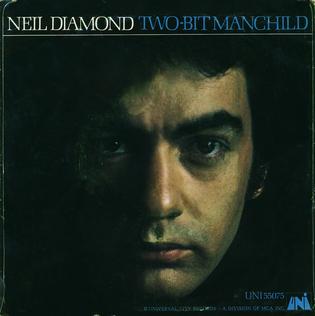
"Two-Bit Manchild" is a song written and performed by Neil Diamond. It appears on Neil's 1968 album Velvet Gloves and Spit, and was released as an A-side with a B-side of "Broad Old Woman ". It is a "strong and interesting" song according to Robert Jamieson.

"Can't You See" is a song written by Toy Caldwell of The Marshall Tucker Band. The song was originally recorded by the band on their 1973 debut album, The Marshall Tucker Band, and released as the album's first single. Record World called it "a strong rhythm item that continually builds and builds." It was re-released in 1977 and peaked at number 75 on the Billboard Hot 100. Cover versions of "Can't You See" have charted for Waylon Jennings and the Zac Brown Band with Kid Rock (2010).

"Woman, Woman" is the debut single by Gary Puckett & The Union Gap, from their 1968 debut album Woman, Woman. It was written and composed by Jim Glaser and Jimmy Payne, and uses session musicians from The Wrecking Crew. Like most of the band's hits, it is a ballad centered around Gary Puckett's soulful vocals. The lyrics are from the perspective of a man who senses that his wife is dissatisfied with him sexually, and fears that she is going to start cheating on him. The song went to number 3 on Cash Box and number 4 on the Billboard Hot 100 in early 1968.

Woman, Woman is the Gold-selling debut album by Gary Puckett & The Union Gap, released in early 1968.

The following is a detailed discography of all singles released by American country music singer Waylon Jennings. A total of 16 Jennings' singles have reached number one on music charts.
"Even Cowgirls Get the Blues" is a song written by Rodney Crowell. It has since been covered by several artists, notably La Costa, Emmylou Harris and Lynn Anderson. Crowell claims to have written "Even Cowgirls Get The Blues" about Harris and her pal Susanna Clark. The title of the song is taken from the then-popular novel of the same name by author Tom Robbins. The song has been released as a single twice and has also has appeared on albums of various artists.
